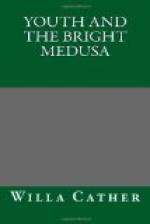Most young men who dwell in obscure studios in New York have had a beginning, come out of something, have somewhere a home town, a family, a paternal roof. But Don Hedger had no such background. He was a foundling, and had grown up in a school for homeless boys, where book-learning was a negligible part of the curriculum. When he was sixteen, a Catholic priest took him to Greensburg, Pennsylvania, to keep house for him. The priest did something to fill in the large gaps in the boy’s education,—taught him to like “Don Quixote” and “The Golden Legend,” and encouraged him to mess with paints and crayons in his room up under the slope of the mansard. When Don wanted to go to New York to study at the Art League, the priest got him a night job as packer in one of the big department stores. Since then, Hedger had taken care of himself; that was his only responsibility. He was singularly unencumbered; had no family duties, no social ties, no obligations toward any one but his landlord. Since he travelled light, he had travelled rather far. He had got over a good deal of the earth’s surface, in spite of the fact that he never in his life had more than three hundred dollars ahead at any one time, and he had already outlived a succession of convictions and revelations about his art.
Though he was now but twenty-six years old, he had twice been on the verge of becoming a marketable product; once through some studies of New York streets he did for a magazine, and once through a collection of pastels he brought home from New Mexico, which Remington, then at the height of his popularity, happened to see, and generously tried to push. But on both occasions Hedger decided that this was something he didn’t wish to carry further,—simply the old thing over again and got nowhere,—so he took enquiring dealers experiments in a “later manner,” that made them put him out of the shop. When he ran short of money, he could always get any amount of commercial work; he was an expert draughtsman and worked with lightning speed. The rest of his time he spent in groping his way from one kind of painting into another, or travelling about without luggage, like a tramp, and he was chiefly occupied with getting rid of ideas he had once thought very fine.
Hedger’s circumstances, since he had moved to Washington Square, were affluent compared to anything he had ever known before. He was now able to pay advance rent and turn the key on his studio when he went away for four months at a stretch. It didn’t occur to him to wish to be richer than this. To be sure, he did without a great many things other people think necessary, but he didn’t miss them, because he had never had them. He belonged to no clubs, visited no houses, had no studio friends, and he ate his dinner alone in some decent little restaurant, even on Christmas and New Year’s. For days together he talked to nobody but his dog and the janitress and the lame oysterman.




